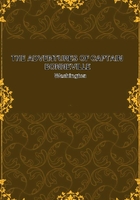
第12章 Irving’s Bonneville - Chapter 4(1)
[Return to Contents]Washington Irving's The Adventures of Captain Bonneville Chapter 4 An alarm--Crow Indians--Their appearance--Mode of approach--Their vengefulerrand--Their curiosity--Hostility between the Crows and Blackfeet-- Loving conductof the Crows--Laramie's Fork-- First navigation of the Nebraska--Great elevation ofthe country--Rarity of the atmosphere--Its effect on the wood-work of wagons--BlackHills--Their wild and broken scenery--Indian dogs--Crow trophies-- Sterile and drearycountry--Banks of the Sweet Water--Buffalo hunting--Adventure of Tom Cain the Irishcook WHEN ON THE MARCH, Captain Bonneville always sent some of his best hunters inthe advance to reconnoitre the country, as well as to look out for game. On the 24th ofMay, as the caravan was slowly journeying up the banks of the Nebraska, the hunterscame galloping back, waving their caps, and giving the alarm cry, Indians! Indians!
The captain immediately ordered a halt: the hunters now came up and announced thata large war-party of Crow Indians were just above, on the river. The captain knew thecharacter of these savages; one of the most roving, warlike, crafty, and predatory tribesof the mountains; horse-stealers of the first order, and easily provoked to acts ofsanguinary violence. Orders were accordingly given to prepare for action, and everyone promptly took the post that had been assigned him in the general order of themarch, in all cases of warlike emergency.
Everything being put in battle array, the captain took the lead of his little band, andmoved on slowly and warily. In a little while he beheld the Crow warriors emerging fromamong the bluffs. There were about sixty of them; fine martial-looking fellows, paintedand arrayed for war, and mounted on horses decked out with all kinds of wild trappings.
They came prancing along in gallant style, with many wild and dexterous evolutions, fornone can surpass them in horsemanship; and their bright colors, and flaunting andfantastic embellishments, glaring and sparkling in the morning sunshine, gave themreally a striking appearance.
Their mode of approach, to one not acquainted with the tactics and ceremonies of thisrude chivalry of the wilderness, had an air of direct hostility. They came gallopingforward in a body, as if about to make a furious charge, but, when close at hand,opened to the right and left, and wheeled in wide circles round the travellers, whoopingand yelling like maniacs.
This done, their mock fury sank into a calm, and the chief, approaching the captain,who had remained warily drawn up, though informed of the pacific nature of themaneuver, extended to him the hand of friendship. The pipe of peace was smoked, andnow all was good fellowship.
The Crows were in pursuit of a band of Cheyennes, who had attacked their village inthe night and killed one of their people. They had already been five and twenty days onthe track of the marauders, and were determined not to return home until they hadsated their revenge.
A few days previously, some of their scouts, who were ranging the country at a distancefrom the main body, had discovered the party of Captain Bonneville. They had doggedit for a time in secret, astonished at the long train of wagons and oxen, and especiallystruck with the sight of a cow and calf, quietly following the caravan; supposing them tobe some kind of tame buffalo. Having satisfied their curiosity, they carried back to theirchief intelligence of all that they had seen. He had, in consequence, diverged from hispursuit of vengeance to behold the wonders described to him. "Now that we have metyou," said he to Captain Bonneville, "and have seen these marvels with our own eyes,our hearts are glad." In fact, nothing could exceed the curiosity evinced by these peopleas to the objects before them. Wagons had never been seen by them before, and theyexamined them with the greatest minuteness; but the calf was the peculiar object oftheir admiration. They watched it with intense interest as it licked the hands accustomedto feed it, and were struck with the mild expression of its countenance, and its perfectdocility.
After much sage consultation, they at length determined that it must be the "greatmedicine" of the white party; an appellation given by the Indians to anything ofsupernatural and mysterious power that is guarded as a talisman. They werecompletely thrown out in their conjecture, however, by an offer of the white men toexchange the calf for a horse; their estimation of the great medicine sank in an instant,and they declined the bargain.
At the request of the Crow chieftain the two parties encamped together, and passed theresidue of the day in company. The captain was well pleased with every opportunity togain a knowledge of the "unsophisticated sons of nature," who had so long beenobjects of his poetic speculations; and indeed this wild, horse-stealing tribe is one of themost notorious of the mountains. The chief, of course, had his scalps to show and hisbattles to recount. The Blackfoot is the hereditary enemy of the Crow, toward whomhostility is like a cherished principle of religion; for every tribe, besides its casualantagonists, has some enduring foe with whom there can be no permanentreconciliation. The Crows and Blackfeet, upon the whole, are enemies worthy of eachother, being rogues and ruffians of the first water. As their predatory excursions extendover the same regions, they often come in contact with each other, and these casualconflicts serve to keep their wits awake and their passions alive.